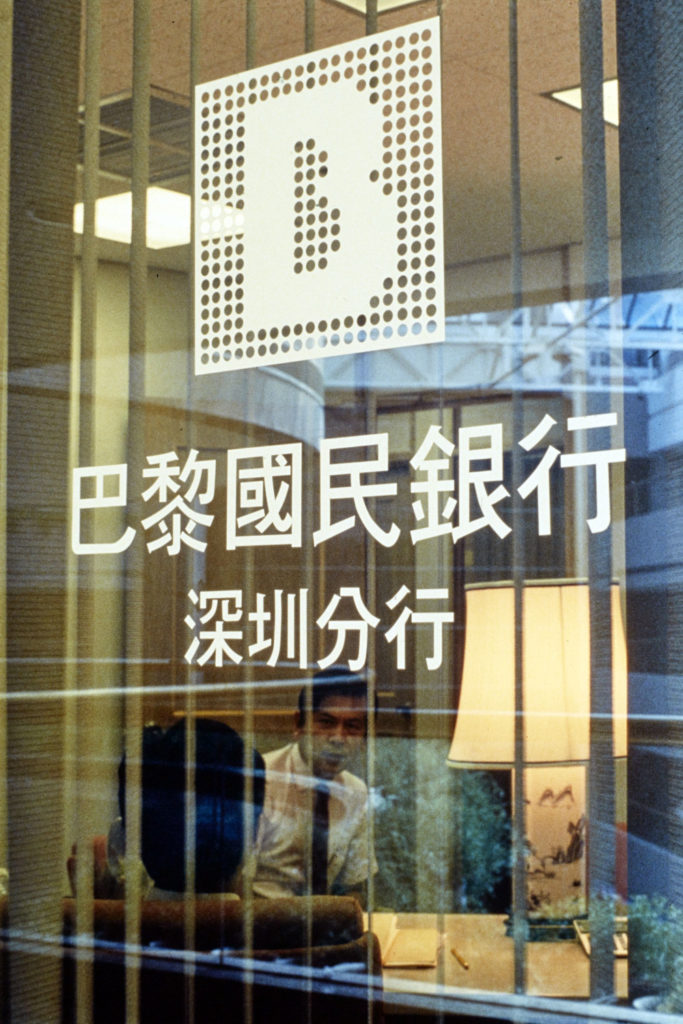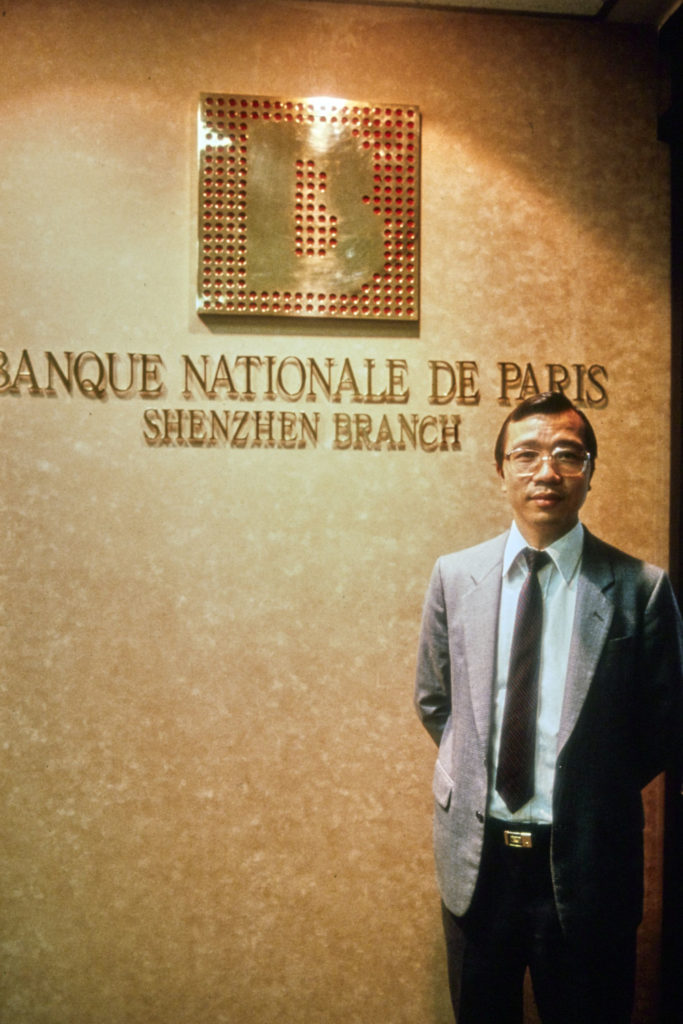BNP Paribas and the opening up of China (1/3) : reconnecting with China

In 1978, the People’s Republic of China entered a new era. Having turned the page on the Cultural Revolution, the new government gave priority to economic development and looked abroad to acquire technology. BNP and Paribas, the predecessor banks of the BNP Paribas Group, were well aware of this: in China, the time is ripe for reform and opening up. Eager to contribute to the modernization of this country, the banks were therefore committed to renewing their ties with the Middle Kingdom…
Changing China
Opening-up
At the end of the 1970s, China was undergoing major upheaval. With the fall of the Gang of Four, Deng Xiaoping returned to the helm of Chinese affairs.
In 1978, the new government announced a pragmatic turn and initiated the Four Modernisations program.

As part of this approach, the Chinese were led to redefine their internal as well as external policies. Henceforth they would look to other countries for the technologies required to develop their economy. The new keywords were reform and openness.
New opportunities

In the West, the announcement of China’s “great leap outwards” stoked enthusiasm in the business community, the Asian giant’s intention to modernise raising hopes that a market hitherto deemed impenetrable would now open up.
The French, as well as their European, American and Japanese partners, were quick to take this new situation into account.
For companies seeking new export opportunities, China was both an opportunity and a challenge, as the world’s largest market was also one of the most unknown and competitive. As the situation unfolded, BNP and Paribas were able to rely on the legacy of their long-standing relationship with China,
Relying on History
The longstanding presence of CNEP, Paribas and Fortis in China
Indeed, the Comptoir National d’Escompte de Paris, the group’s ancestor bank, had played a pioneering role by opening a branch in Shanghai as early as 1860.
For their part, Paribas and Fortis played a leading role in financing the major infrastructure projects undertaken during the last years of the Celestial Empire.

Reference 9Fi71
Returning to China
However, the political situation in China became increasingly unstable from the 1920s onwards, and the onset of the Cold War forced the group to leave the country and retreat to British territory in Hong Kong. It was not until the late 1970s that BNP and Paribas were able to regain a foothold in the People’s Republic.
From that time onwards, banks rolled out substantial financial and human resources to provide their partners with the means to carry out their projects. Banks soon assumed a central role in the development of China’s trade with foreign countries, fully participating in the economic boom of the world’s most populous country.
Finding its place on China’s soil
Following the opening of China, the challenge for the two ancestor banks of BNP Paribas was to strengthen their presence on the ground. To that end, they set up a number of offices to represent them with the local authorities, monitor political and economic events, and serve as a welcome facility for customers visiting the country.
The arrival of BNP…
Establishing business in China was BNP’s key focus of the late 1970s, and it outstripped all of its European rivals in this respect. The bank’s chairmen demonstrated a keen interest in the People’s Republic, with Pierre Ledoux being the first high-level European banker to visit Beijing.
To support manufacturers in China, the bank opened its first representative office in Hong Kong in 1976, followed by an office in Beijing in 1980. This initial breakthrough was followed by the establishment of new offices in Guangzhou, Shanghai and Shenzhen.
By the mid-1980s, BNP already had nearly 20 people working in China, supervised from Beijing in conjunction with the “China” offices of BNP Paris, BNP Hong Kong and BNP Singapore. This presence was further boosted at the beginning of the 1990s with the creation of branches and new offices.

… and of Paribas

Paribas also remained true to its international tradition. It enjoyed long-standing contacts with the People’s Republic, renewed as early as 1952. The bank’s directors were quick to move into the continent, as evidenced in 1982 by Jean-Yves Haberer’s choice of China as his first trip abroad.
Paribas opened its first representative office in Beijing in 1981. In the years that followed, the bank focused its activities on new areas of Chinese development. It set up business in Shanghai and Guangzhou and then became the first Western bank to operate in Tianjin and Dalian.
By the mid-1980s, Paribas had a dozen employees in the country. The bank also had a branch in Hong Kong, as well as the investment bank Paribas Asia Ltd and a regional sales and marketing office.
The bank as an intermediary in the dialogue with China
The “clandestine years”
Those who participated in the early days of this adventure can attest to the fact that yesterday’s China was nothing like today’s China. The period that had just begun was that of the “clandestine years“, evoked with a touch of nostalgia by Yang Guang Zhi, then deputy delegate at the Paribas office in Beijing. The bank’s representative in Beijing, Alban Yung, says that conditions were somewhat challenging in the early days. “We slept and worked in a basic hotel room with non-existent service, a telephone that didn’t work, and so on.”
But the special conditions under which BNP and Paribas entered China did not prevent the two banks from paving the way for companies to enter the country. Thanks to their presence on the ground, BNP and Paribas quickly became key players in Franco-Chinese dialogue. Sometimes banks were approached with unusual requests. Few foreign companies had equipment such as photocopiers or fax machines, and many of them called on their bankers to handle their business needs, be it booking a hotel room or arranging travel by helicopter.

“A commercial and technical tourist office”
The services rendered were nevertheless an excellent way of consolidating banker-customer relations and approaching the Chinese authorities in a concrete manner, as reflected in the business activity of the BNP office at the Beijing Hotel.
Referred to as an “office of commercial and technical tourism”, the premises were graced by a steady stream of visits, including from a number of high-level French ministers and industrialists.
BNP assisted them with last-minute arrangements, be it settling their hotel bill, providing information about China or introducing them to Chinese partners. The bank was also called on extensively by Chinese people seeking to find out more about French companies.

The Paribas offices played a similar role, with Alban Yung, the bank’s representative in China, earning the nickname of “Beijing’s one-man band”. With a team made up of professionals from Beijing, Shanghai and Canton, Paribas stood apart from other banks, which preferred to use French or Hong Kong executives.

This local presence was undoubtedly an asset for the bank’s activities in China, and a number of companies, such as Bull, Airbus and Compagnie Générale d’Électricité, came to rely on Paribas’ network.
Paribas and BNP also regularly organised Chinese missions to France and French missions to China, bringing their partners the opportunity to envision real-life cooperative ventures.
The delegates from Tianjin Town Hall referred to this sort of opportunity when invited by Paribas to visit the BSN plant in Vayres. Impressed by the plant’s agronomic equipment and processes, the Chinese ensured the future of trade relations in this field. All that remained was to make this cooperation effective…








